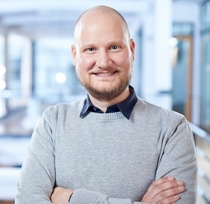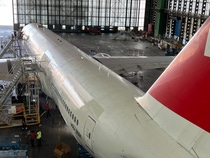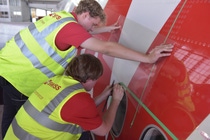Media
Joint News Release:
First Boeing 777 with AeroSHARK takes off on passenger flights
- Surface technology developed jointly by Lufthansa Technik and BASF
- Fuel and emissions savings of around one percent calculated
- Modified aircraft now begins validation of savings potential in daily flight operations
Today, for the first time, a Boeing 777-300ER operated by Swiss International Air Lines (SWISS) took off on a passenger flight with the AeroSHARK surface technology jointly developed by Lufthansa Technik and BASF. The fuselage and engine nacelles of the aircraft were recently fitted with approximately 950 square meters of so-called Riblet films, which replicate the flow-efficient properties of shark skin in order to reduce drag. Flow simulations have already identified a savings potential of just over one percent for this type of aircraft. The first scheduled flights with the aircraft registered as HB-JNH will now serve to validate this savings potential in daily flight operations.
Thanks to its special surface structure of microscopic ribs - known as Riblets - AeroSHARK reduces the frictional resistance of this aircraft's outer skin by just over one percent, according to the calculations and flow simulations. As a result, fuel consumption and CO2 emissions are also reduced by the same order of magnitude. For this Boeing 777-300ER of SWISS, this would equate to annual savings of around 400 tons of kerosene and more than 1,200 tons of carbon dioxide.
The AeroSHARK modification of the HB-JNH began at the end of August and culminated in several test flights on September 8 and 9. During these flights, it had to be demonstrated in detail that the AeroSHARK modification had no negative impact on the operational safety and handling of the Boeing 777.
As soon as the calculated savings potential has been validated in actual flight operations, the full-scale roll-out at the launch customers SWISS and Lufthansa Cargo is planned to begin. Further Boeing 777s will then receive the AeroSHARK modification as part of regular maintenance layovers. Both airlines plan to have all their Boeing 777-300ERs and 777Fs successively fitted with AeroSHARK. This would make them the first passenger and cargo airlines worldwide to optimize a complete sub-fleet with this technology. When all of the current eleven Boeing 777s at Lufthansa Cargo and twelve at SWISS have received their AeroSHARK modification, they will reduce the Lufthansa Group's carbon footprint by more than 25,000 tons annually.
About BASF:
Chemistry for a sustainable future - that's what BASF stands for. We combine economic success with environmental protection and social responsibility. Around 111,000 employees in the BASF Group contribute to the success of our customers from almost all industries and in almost every country in the world. Our portfolio comprises six segments: Chemicals, Materials, Industrial Solutions, Surface Technologies, Nutrition & Care and Agricultural Solutions. BASF achieved global sales of €78.6 billion in 2021. BASF shares are traded on the Frankfurt Stock Exchange (BAS) and as American Depositary Receipts (BASFY) in the United States. For more information, visit www.basf.com.
About Lufthansa Technik:
With some 35 subsidiaries and affiliates, the Lufthansa Technik Group is one of the leading providers of technical aircraft services in the world. Certified internationally as maintenance, production and design organization, the company has a workforce of more than 20,000 employees. Lufthansa Technik’s portfolio covers the entire range of services for commercial and VIP/special mission aircraft, engines, components and landing gear in the areas of digital fleet support, maintenance, repair, overhaul, modification, completion and conversion as well as the manufacture of innovative cabin products.
| Press contact Lufthansa Technik: | Press contact BASF: | |
| Michael Lagemann | Joerg Zumkley | |
| Spokesperson | Global Communications Coatings | |
| +49 40 5070 65906 | +49 2501 143453 | |
| michael.lagemann@lht.dlh.de | joerg.zumkley@basf.com | |
P-22-385



